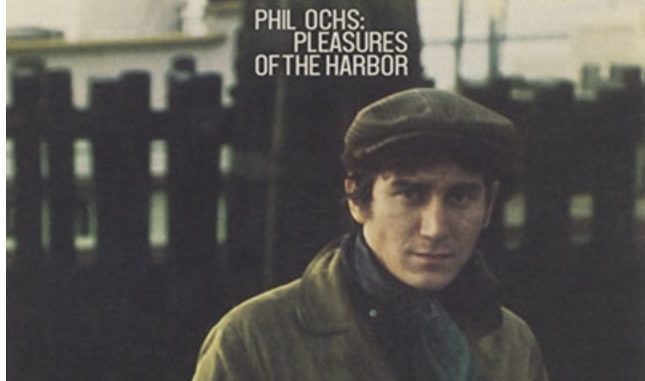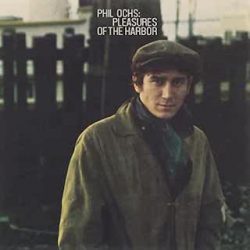
 By late 1967 Phil Ochs had left New York where for the previous five years he had carved out a name for himself as one of the protagonists of the vibrant folk movement. He had been seen by many as Bob Dylan’s most serious rival, but chose to relocate to Los Angeles with the vision of reinventing himself using a broader and more adventurous musical palette. His previous three albums for Elektra had been typical of the folk genre featuring a plain acoustic guitar and voice arrangement, but for his fourth album and first for A&M, ‘Pleasures Of The Harbor’ he would produce an album that would encompass a myriad of sounds and instruments and in doing so completely abandon the protest songs of which he had made his reputation. Due to a change in management Ochs would be one of the last major folk singers, or topical singer as he preferred to be called, to attempt the more lucrative transition to the rock world drafting in producer Larry Marks along with Lincoln Mayorga on Piano, Ian Freebairn-Smith who was given the responsibility for translating Ochs’ countermelodies into a finished product utilising a whole range of instruments, and a young Warren Zevon who supplied guitar on the title track. One can only imagine what working in such close proximity with Ochs must have had on a young and impressionable Zevon who would go on to be one of the finest songwriters of his generations with his own brand of self mocking satirical wit. The finished album would defy any distinctive musical categorisation drawing on everything from Dixieland jazz, baroque folk, pure rock ‘n’ roll, traces of classical music to even a touch of electronic avant-garde. Lyrically things had changed as well, for though his poetry still remained uncompromisingly direct, with the usual dose of vitriolic sarcasm mixed with a keen cinematic eye for reflecting the times, the focus of his attention and criticism had swung from the political frontline to society’s front room.
By late 1967 Phil Ochs had left New York where for the previous five years he had carved out a name for himself as one of the protagonists of the vibrant folk movement. He had been seen by many as Bob Dylan’s most serious rival, but chose to relocate to Los Angeles with the vision of reinventing himself using a broader and more adventurous musical palette. His previous three albums for Elektra had been typical of the folk genre featuring a plain acoustic guitar and voice arrangement, but for his fourth album and first for A&M, ‘Pleasures Of The Harbor’ he would produce an album that would encompass a myriad of sounds and instruments and in doing so completely abandon the protest songs of which he had made his reputation. Due to a change in management Ochs would be one of the last major folk singers, or topical singer as he preferred to be called, to attempt the more lucrative transition to the rock world drafting in producer Larry Marks along with Lincoln Mayorga on Piano, Ian Freebairn-Smith who was given the responsibility for translating Ochs’ countermelodies into a finished product utilising a whole range of instruments, and a young Warren Zevon who supplied guitar on the title track. One can only imagine what working in such close proximity with Ochs must have had on a young and impressionable Zevon who would go on to be one of the finest songwriters of his generations with his own brand of self mocking satirical wit. The finished album would defy any distinctive musical categorisation drawing on everything from Dixieland jazz, baroque folk, pure rock ‘n’ roll, traces of classical music to even a touch of electronic avant-garde. Lyrically things had changed as well, for though his poetry still remained uncompromisingly direct, with the usual dose of vitriolic sarcasm mixed with a keen cinematic eye for reflecting the times, the focus of his attention and criticism had swung from the political frontline to society’s front room.
The album opens with ‘Cross My Heart’ which immediately serves notice of Ochs’ narrative shift from the political commentary to the more abstract nuances of the heart whilst harpsichord, flutes and horns all combine to create a musical counterpoint that constantly wrestles with the poetry for the spotlight. In truth one can only imagine the impact the quantum shift in musical style must have had on fans and critics alike, for even fifty-five years on from its original release the song still requires multiple listenings to absorb all its deftness and hidden layers. This is followed by ‘Flower Lady’ with its introduction of violin and piano accompaniment that leads to one of Ochs’ finest cinematic narratives as he observes the hustle and bustle of the streets of New York and the contrasting characters going about their day. Each of them engrossed in their own world, each of them having one thing in common, all ignoring the lady selling flowers. Here the supporting instrumentation is more accommodating with strings and oboe creating a pseudo-chamber classical arrangement that embraces one of Ochs’ finest melodies that even at a lengthy six minutes never seems too maudlin or overstay its welcome.
Things continue with what is probably Ochs’ best known song ‘Outside Of A Small Circle Of Friends’ which used the murder of Kitty Genovese on the streets of New York in front of numerous witness to viciously and sarcastically taunt the apathetic nature of people when confronted with anything that infringes on their own world. Ochs’ wonderful barbed narrative expands the subject matter on subsequent verses while the juxtaposition of the arrangement with its jaunty Dixieland piano against his deadpan vocal delivery help to create a levity that enables the chilling message within the song to cut to the bone. The musical arrangement makes another tonal shift on track four ‘I’ve Had Her’ with its piano led accompaniment supporting a thoroughly lugubrious mood pieces of a failed relationship highlighted by one of the most heartless put-down lines in pop music history. The stark musical contrast that the following track ‘Miranda’ conjures is by now typical of the album as its lighthearted Dixieland jazz score is coupled with Ochs’ acute narrative detail and sardonic humour. Dylan clearly had a high respect for Ochs’ especially his early recordings yet despite this once threw him out of a limousine they were sharing with the accusation that he was more a journalist than a folksinger. However, none of his early successes such as ‘I Ain’t Marching Anymore’, ‘Too Many Martyrs’, ‘There But For Fortune’ or any of his later work support this slight and in truth Ochs’ writing was always far more engaged with passionate prose than objective reporting.
Track six ‘The Party’ marries the perfect lyrical satire, savaging the local high class snobs, while ridiculing the absurdity and extravagance of their gathering with a lounge piano accompaniment that mimics the classical composers such as Bach and Beethoven. This is followed by the title track a bittersweet tale of sailors on shore leave who find themselves longingly looking back out to sea unable to adapt to life on dry land or take advantage of all it has to offer. This could also be seen as a metaphor for escape and the search for human comfort and connection as throughout the album Ochs’ consistently imbued his lyrics with images of mortality.
The album comes to a close with what is considered Ochs’ most controversial and ambitious composition. Coming in at over eight minutes long, though to be fair so did the previous two tracks, ‘Crucifixion’ is the writers magnum opus with its musique concrete arrangement and ten verses on martyred heroes, from Jesus Christ to President Kennedy providing the perfect unabashed finale to this, his most outrageous and uncompromising album but also his greatest accomplishment. What gave this song such notoriety was not so much the lyrics or the subject matter, as controversial as an emerging hero in a corrupt world fated through betrayal to inevitable downfall might appear, but rather the eclectic experimentalism of the arrangement with its eerie morass of loops electric harpsichord and washes of electronic distortion all courtesy of Joseph Byrd better known to many for his work with the rock group United States Of America. Here, like a gambler with one last throw of the dice, Ochs’ dares the listener to traverse the songs complicated arrangement only to discover that the final bars, and final words offer no satisfying resolution, other than the realisation that nothing compromised can truly be fulfilled. And yet even though this may be anything but an easy listen, for those who persevere the rewards are plentiful revealing nuggets of pure musical gold with every listen and providing the perfect conclusion to an album that so prophetically anticipated the tragic and devastating fate of the late sixties and early seventies as well as Ochs’ own sad decline and demise.
‘Pleasures Of The Harbor‘ is the finest album by one of the greatest and inspirational songwriters to come out of what was probably the most influential period of popular music, dripping with all the decadence that the advances in production techniques had allowed the most adventurous of acts of the period. With Its eight songs and running time in excess of fifty minutes this is an album that defies musical categorisation by courageously mixing a myriad of genres to create something unlike anything before or after, and though it failed to dent the charts one feels that Ochs’ aspirations always lent more towards social impact than any monetary benefits. It may be argued that the album’s musical composition positions it towards the outer margin of what might be considered ‘americana’, and yet the sublime poetic narrative coupled with a keen cinematic eye help to create a storytelling masterpiece that epitomises the very beating heart of the genre. ‘Pleasure Of The Harbor’ is an album that repeatedly rewards the listener over and over again and considering the times we’re currently living through is ripe for rediscovering as is the artist himself.



A marvellous and comprehensive review of one of the great folk albums of all time. During his lifetime and subsequently Phil Ochs has never got the recognition he deserved. When one looks at all the turmoil in the world today, we can only lament that Phil Ochs is not here with us when we need him most.
Glad you enjoyed the review Patrick, and yes, today’s world could certainly benefit from his songs full of sagacious lyrics that challenged the political status quo. Don’t know whether you came across a recent album by Phil Odgers and John Kettle called “Far Rockaway”, that revisits some of Ochs’ great songs which will hopefully introduce him to a new audience.